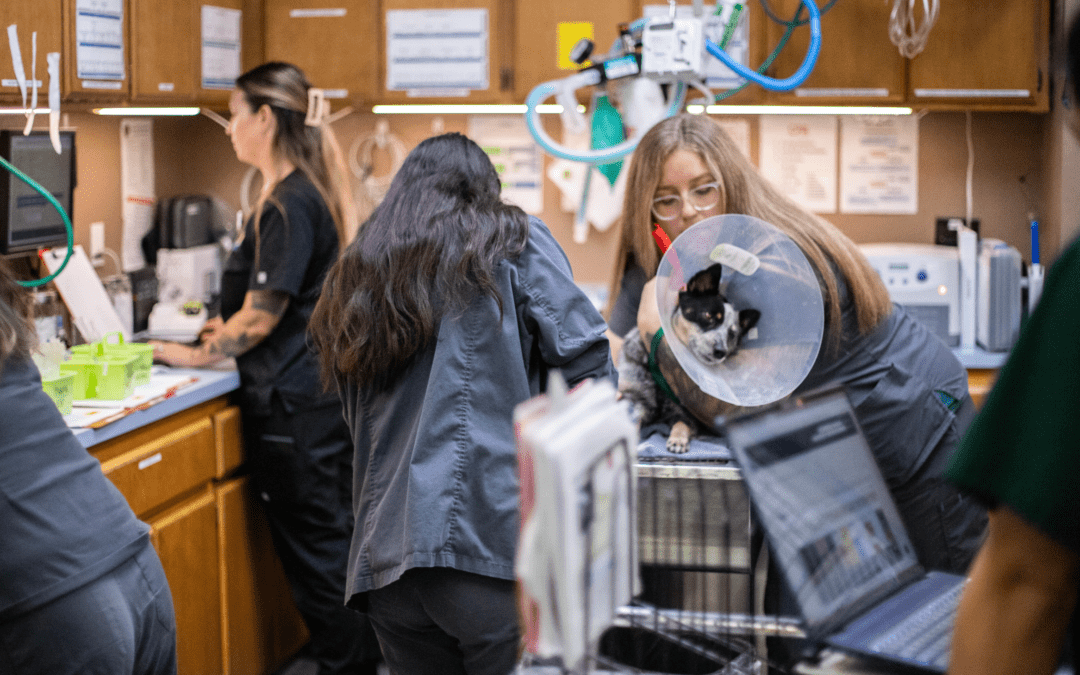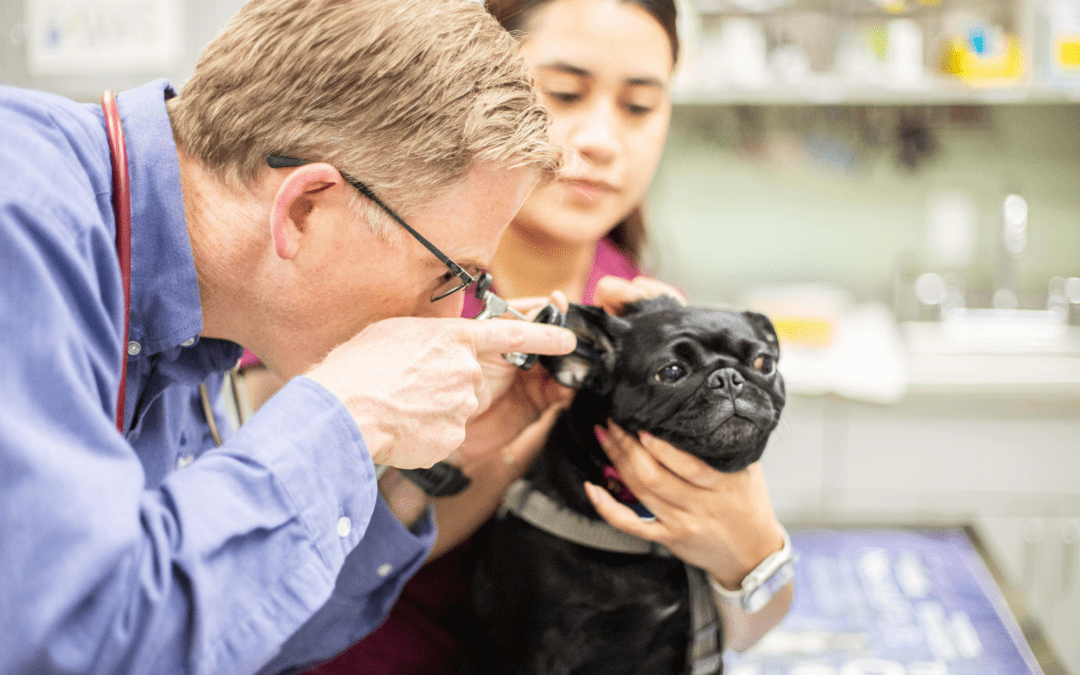Professionals in the veterinary industry overcome a lot of daily challenges in their clinics, and veterinary technicians are certainly no exception. Supporting sick and injured pets, collecting and testing samples in the lab, prepping for surgeries, and communicating with pet owners are just a few of the many tasks vet techs are responsible for every day.
There’s a lot going on, which can directly impact their overall mental and physical health—especially if their practice fails to provide them with the supportive environment they need to thrive in. From fair pay to opportunities for growth and development, we’re covering all the ways you can reward the vet techs in your practice by giving them what they truly want—and deserve—to continue their success.
1. Prioritize fair pay for every veterinary technician
Like most veterinary professionals, vet techs enter the veterinary field because of their passion for animal care, but that doesn’t mean we should ignore the financial reality of the job. According to the U.S. Bureau of Labor Statistics, the average wage for U.S. Veterinary Technicians in 2023 was around $38,250 per year.1 This figure doesn’t even cover the average annual living cost for a single American, which sits at $44,312 according to a 2022 article by InCharge.2
When it comes to ensuring fair pay at your own clinic, here are some questions to consider:
- Are you paying your staff a livable wage?
- Have you adjusted wages to account for inflation?
- Is your credentialed staff being compensated fairly for their expertise?
Veterinary technicians are emotionally, mentally, and physically taxed each work day, which makes it even more critical that they’re compensated for their commitment toward excellent patient care. Providing fair compensation will keep vet techs motivated to continue doing their absolute best, so be sure to offer a competitive wage that reflects both their technical skills and their compassion for the great work they do.
2. Welcome a healthy work-life balance in your veterinary clinic
With high risks of burnout and compassion fatigue, veterinary technicians often endure long working hours and high demands in their clinics. This type of pressure can quickly overwhelm even the most passionate vet techs, especially if there’s little time to take a break amid the bustle of busy clinic life.
You can help prevent occupational burnout by first asking yourself:
- Are your employees frequently working overtime?
- Do they feel comfortable using their accumulated PTO?
- Is your clinic adequately staffed to prevent overburdening your team?
Supporting a healthy work-life balance is more than just providing your employees with PTO—it’s about creating an environment where veterinary technicians feel comfortable taking time off without feeling guilt or shame. A balanced team is a strong and healthy team, which is exactly what every clinic needs to provide the absolute best care to the pets they serve.
3. Shout out your vet techs for their hard work!
Recognition is rejuvenating for any professional within any workplace, but especially for veterinary technicians who work tirelessly to promote the best possible pet health outcomes. Even though vet techs come prepared with their expertise and skills to support pets and their owners each and every day, they sometimes do so without being recognized and appreciated. A simple thank you or acknowledgment of their hard work and dedication can go a long way in showing your support for veterinary technicians!
With the right amount of respect and appreciation, veterinary technicians can focus more on their responsibilities and team contributions and less on worrying about a lack of support in their workplace. Even better than a well-deserved thank you, we’ve got you covered with thoughtful ways to show appreciation for your own vet techs! The smallest signs of gratitude can make a huge difference in vet techs’ job satisfaction and overall well-being, creating a sense of belonging and purpose that keeps them motivated day after day.
See what PetDesk makes possible
Our solutions are designed to tackle your clinic’s specific challenges.
Set up time with a PetDesk expert to see for yourself!
4. Foster a healthy veterinary workplace that’s free of toxicity
Of course, no one likes working in a toxic environment, but some indications of toxicity aren’t as obvious as others. A toxic work environment is one of the fastest ways to lose talented employees, so it’s imperative to remain vigilant to the warning signs whether they appear to be big or small. Workplace bullying, for example, is unfortunately a common issue in the veterinary field. From gossiping and undermining to outright hostility, toxicity can spread quickly and inevitably affect the entire team in a number of negative ways.
Here’s how you can take actionable steps toward preventing workplace toxicity and ultimately stay ahead of the friction:
- Provide anti-harassment training for all staff members on a regular basis.
- Ensure your HR department is prepared to handle complaints quickly and effectively.
- Invite an open-door policy where employees feel safe speaking up about anything.
Toxic environments can damage or totally destroy team morale, leading to higher turnover among staff. More than veterinary technicians, all professionals deserve to work in an environment that’s free from bullying, harassment, and fear. You can keep your team happy and productive by addressing these issues quickly, and taking appropriate actions as necessary.
5. Provide opportunities for veterinary growth and development
Every professional wants the chance to grow and advance in their careers, so be sure to offer your veterinary technicians the opportunity to continue expanding their skills and expertise. With a clear path toward career advancement, you’ll boost individual morale for veterinary technicians and other employees while collectively strengthening your entire team, becoming a more unified and efficient unit than ever before.
Show your strong support in your vet techs’ professional development by taking a few options into consideration:
- Continue their veterinary education through workshops, conferences, or online courses.
- Encourage veterinary technicians to pursue certifications in specialty services, like becoming a veterinary technician specialist (VTS).
- Implement career paths that include management roles for more experienced veterinary technicians.
By providing a clear pathway for each employee’s professional development, you’ll show how committed you are to ensuring the long-term success and growth of not only your veterinary technicians, but your entire veterinary team.
Reward your vet techs with what they truly deserve!
Veterinary technicians love what they do, and don’t want to leave the veterinary industry if they don’t have to. That’s where you come in! You can maintain the momentum of your vet techs and keep them happy by prioritizing fair pay, promoting a healthy work-life balance, recognizing them for their hard work, and cultivating a toxic-free work environment that encourages professional growth and career development. Show your appreciation to each veterinary technician so they can have even more pride in their day-to-day, and you’ll be quickly on your way to a stronger team and more successful clinic.
¹ U.S. Bureau of Labor Statistics. American Veterinary Medical Association. “Occupational Employment and Wage Statistics, May 2023.” Accessed October 2024.
2 InCharge Debt Solutions. “Average Monthly Expenses for American Households.” Accessed October 2024.
What vet techs really want (and deserve!) in the workplace FAQs
Q. Why is it important to provide fair pay to veterinary technicians?
A. Fair pay is crucial for veterinary technicians because they perform a wide range of duties, from caring for sick animals to assisting with surgeries. In addition to their passion for animal care, they deserve to be compensated fairly for their technical skills and commitment. Offering a competitive, livable wage helps to motivate them and reflects the valuable contributions they make to the clinic.
Q. How can clinics help vet techs maintain a healthy work-life balance?
A. Supporting a healthy work-life balance starts with evaluating whether your team is frequently working overtime and whether they feel comfortable using PTO. A well-staffed clinic ensures that vet techs can take time off without guilt, preventing burnout and compassion fatigue. A balanced workload promotes overall job satisfaction and leads to better care for pets.
Q. What are some ways to show appreciation to veterinary technicians?
A. Simple gestures like saying “thank you” or recognizing hard work can greatly boost a vet tech’s morale. Additionally, offering tangible rewards such as bonuses or special recognition during team meetings can further show appreciation. When vet techs feel valued, they are more likely to stay engaged and motivated in their roles.
Q. How can veterinary practices prevent a toxic work environment for vet techs?
A. To prevent toxicity, practices should regularly provide anti-harassment training, handle complaints swiftly through HR, and promote an open-door policy where employees can voice concerns safely. Toxic environments can lead to high turnover rates, so addressing issues of bullying or hostility promptly is vital to maintaining a positive and productive workplace.
Q. Why is professional development important for vet techs, and how can clinics support it?
A. Vet techs, like any professionals, thrive when given opportunities for growth. Clinics can support this by offering continuing education through workshops, conferences, or certifications in specialty areas. Establishing career paths, including management roles for experienced technicians, shows a commitment to their long-term success and encourages loyalty to the clinic.
Q. What can veterinary practices do to retain talented vet techs?
A. To retain talented vet techs, clinics should prioritize fair compensation, support a healthy work-life balance, provide regular recognition for hard work, and ensure a workplace free of toxicity. Additionally, offering opportunities for career growth and professional development shows that the clinic is invested in their success, helping keep techs engaged and committed to their roles.
See the power of PetDesk for yourself—for free
Save time and grow your business with custom websites and digital marketing, 24/7 error-free booking, a PIMS-VoIP phone system, plus a client engagement platform with a mobile app.






